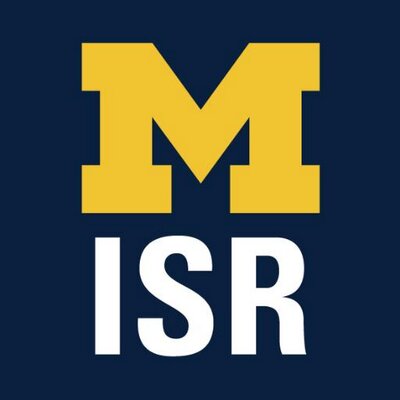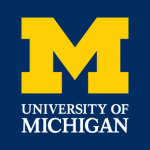Resources
Contact us to recommend resources to add to this list.
ISR Data Science Portal People Profiles 


To help identify potential collaborators for research, consulting or expertise, the ISR Data Science Portal features profiles of ISR faculty and staff interested or engaged in big data and/or data science research. The People database can be searched by name, keyword, and filtered by expertise in social science domains, methods and programming skills.
ISR-affiliated faculty and staff interested or engaged in data science related activities can add their personal profile and project information to the People and Project pages following this process:
- Register HERE.
- Check your email inbox for your credentials
- Login
- Create your profile and add your expertise and data science projects, if any (The more info the better!)
Michigan Research Experts Database 


Michigan Research Experts is a searchable database of research expertise across the University of Michigan, developed by the Medical School Office of Research and custom-tailored for the U-M research community to foster collaboration on campus and around the world. In addition to finding collaborators, the tool can be used to identify funding sources, as well as, to track engagement metrics and patents. U-M faculty and staff can create their own profile to be featured.
MIDAS Affiliated Faculty 


The website of the Michigan Institute for Data Science (MIDAS) at the University of Michigan features a searchable database of affiliated faculty. The database can be searched by name, department, or keyword, and/or filtered by methodology or research domain (application).
Survey Methodology Program 


The Survey Methodology Program (SMP) within the Survey Research Center (SRC) at the Institute for Social Research (ISR) comprises a multidisciplinary team of research faculty and research scientists originating from various academic fields, including social psychology, cognitive psychology, sociology, statistics, and computer science. SMP members share a scientific focus on research methodology and are open to collaborating with researchers worldwide on methodological projects and research proposals related to survey research, data collection, and analysis of survey data. For a list of SMP’s core and associated faculty, please see here.
Research Project Lifecycle 


Michigan Medicine created the Research Project Lifecycle, which provides an overview of the resources available not only within the Medical School Office of Research but also across the University. Resources are categorized by funding and proposals, regulatory compliance, project management, cores, and training.
Statcom 


Statistics in the Community (STATCOM) at the University of Michigan is a community outreach program provided by graduate students in the Departments of Biostatistics, Statistics, and the Program for Survey Methodology at University of Michigan. The program offers statistics expertise to non-profit governmental and community organizations in the areas of data organization, analysis, and interpretation free of charge.
AWS Data Exchange 


Amazon Web Services (AWS) Data Exchange makes it easy to find, subscribe to, and use third-party data in the Amazon cloud. The initiative sources third-party data to help academics, researchers, and the healthcare community triage COVID-19 related issues. The data is derived from public records, foot traffic and business visitation patterns, economic activity, and more. Review COVID-19 related data products available on AWS Data Exchange here. Click here to browse all COVID-19 related data on AWS Data Exchange.
COVID-19 High Performance Computing Consortium 


The COVID-19 High Performance Computing Consortium is a joint initiative by the federal U.S. government, industry, and academic leaders to provide access to the world’s most powerful high-performance computing resources in support of complex computational COVID-19 research programs. The Consortium seeks to support research in areas such as bioinformatics, epidemiology, and molecular modeling to understand the threat faced by the novel Coronavirus, as well as to develop strategies to address it. Interested research are invited to submit COVID-19 related research proposals to the consortium via the online portal. Proposals will be reviewed for matching with computing resources from one of the partner institutions.
Free access to COVID-19 research via Dimensions 


Digital Science is making freely available all COVID-19 related published articles, preprints, datasets and clinical trials from Dimensions. The file is available as as a csv file hosted on figshare and contains the details of (and links to) all relevant research items. The content has been exported from Dimensions using a query in the openly accessible Dimensions application, accessible at https://covid-19.dimensions.ai/. Dimensions is updated once every 24 hours, so the latest research can be viewed alongside existing information.
U-M IHPI COVID-19 News and Resources 


The Institute for Healthcare Policy and Innovation (IHPI) is maintaining a web page on COVID-19 related news and resources. U-M affiliates can access a spreadsheet on available resources for COVID-19 research using their Level-1 login.
U-M Library COVID-19 Research Guide 


The University of Michigan Library has put together a research guide on the COVID-19 pandemic/novel coronavirus. To access the research guide, follow this link. Access to some of the listed resources may be limited to U-M affiliates.
AWS Data Exchange 


Amazon Web Services (AWS) Data Exchange makes it easy to find, subscribe to, and use third-party data in the Amazon cloud. The initiative sources third-party data to help academics, researchers, and the healthcare community triage COVID-19 related issues. The data is derived from public records, foot traffic and business visitation patterns, economic activity, and more. Review COVID-19 related data products available on AWS Data Exchange here. Click here to browse all COVID-19 related data on AWS Data Exchange.
Free access to COVID-19 research via Dimensions 


Digital Science is making freely available all COVID-19 related published articles, preprints, datasets and clinical trials from Dimensions. The file is available as as a csv file hosted on figshare and contains the details of (and links to) all relevant research items. The content has been exported from Dimensions using a query in the openly accessible Dimensions application, accessible at https://covid-19.dimensions.ai/. Dimensions is updated once every 24 hours, so the latest research can be viewed alongside existing information.
ICPSR 


The Inter-university Consortium for Political and Social Research (ICPSR) is an international consortium of more than 750 academic institutions and research organizations that provides leadership and training in data access, curation, and methods of analysis for the social science research community.
ICPSR maintains a data archive of more than 250,000 files of research in the social and behavioral sciences. It hosts 21 specialized collections of data in education, aging, criminal justice, substance abuse, terrorism, and other fields.
U-M IHPI COVID-19 News and Resources 


The Institute for Healthcare Policy and Innovation (IHPI) is maintaining a web page on COVID-19 related news and resources. U-M affiliates can access a spreadsheet on available resources for COVID-19 research using their Level-1 login.
U-M Library COVID-19 Research Guide 


The University of Michigan Library has put together a research guide on the COVID-19 pandemic/novel coronavirus. To access the research guide, follow this link. Access to some of the listed resources may be limited to U-M affiliates.
MIDAS Events 


The Michigan Institute for Data Science (MIDAS) organizes a variety of events for the University of Michigan data science community throughout the year. Click here for MIDAS event calendar on their website, or here to directly access MIDAS’ public Google Calendar for U-M Data Science Events.
Upcoming Data Science Events 


12
MIDAS - ICPSR Social Data Science Summer Academy
Off Campus Location @ 8:30AM13
MIDAS - ICPSR Social Data Science Summer Academy
Off Campus Location @ 8:30AM14
MIDAS - ICPSR Social Data Science Summer Academy
Off Campus Location @ 8:30AMMIDAS Weekly Newsletter 


The Michigan Institute for Data Science (MIDAS) maintains a large data science mailing list to disseminate a weekly data science newsletter (click here to subscribe). ISR faculty and staff interested in hiring students or staff for data science related positions can have their job postings published in the MIDAS weekly newsletter. To be featured, email your student research opportunities and job postings to James Walsh ([email protected]), MIDAS Communications Officer and Operations Coordinator.
Data Science Master’s Program Students (LSA Statistics) 


The Data Science Master’s Program in the University of Michigan Department of Statistics announces research opportunities to its students. ISR faculty and staff interested in hiring students enrolled in the Data Science Master’s Program can reach out to the Data Science Master’s Program Coordinator, via [email protected] or available through the LSA Statistics directory. You can also copy Kerby Schedden ([email protected]), Professor in the Statistics and Biostatistics Departments, to help identify the most relevant students for a given project.
EECS Undergraduate Students 


The University of Michigan Department of Electrical Engineering and Computer Science (EECS) shares weekly announcements with its undergraduate students in Computer Engineering, Computer Science, Electrical Engineering and/or Data Science. ISR faculty and staff can use this form to submit content for these email announcements. The weekly submission deadline is 5:00PM EST on Sundays.
MIDAS Weekly Newsletter 


The Michigan Institute for Data Science (MIDAS) maintains a large data science mailing list to disseminate a weekly data science newsletter (click here to subscribe). ISR faculty and staff interested in hiring students or staff for data science related positions can have their job postings published in the MIDAS weekly newsletter. To be featured, email your student research opportunities and job postings to James Walsh ([email protected]), MIDAS Communications Officer and Operations Coordinator.
U-M Students 


The University of Michigan Student Employment Office maintains an online portal in which students can search and apply for part-time (Work-Study) and regular (non-Work-Study) jobs. University and Work-Study Employers, as well as, Non-University Employers can use this portal to post such employment opportunities to U-M students.
UMSI Students 


The University of Michigan School of Information (UMSI) maintains an online portal to help in the recruiting of their students. ISR Faculty and staff can register for an account in UMSI’s online recruiting system (iTrack) to post internship or employment opportunities.
ACM SIGHPC Computational & Data Science Fellowships 


ISR Research Fellowships 


The Institute for Social Research (ISR) at the University of Michigan provides a number of scholarship opportunities available to graduate students, research fellows and faculty, and emerging scholars in the social sciences. All applications are unique in terms of timelines and eligibility, but most close by the summer and restart in January.
Michigan Research Experts Database 


Michigan Research Experts is a searchable database of research expertise across the University of Michigan, developed by the Medical School Office of Research and custom-tailored for the U-M research community to foster collaboration on campus and around the world. In addition to finding collaborators, the tool can be used to identify funding sources, as well as, to track engagement metrics and patents. U-M faculty and staff can create their own profile to be featured.
National Institutes of Health 


National Science Foundation 


The National Science Foundation (NSF) funds research and education in most fields of science and engineering. It does this through grants, and cooperative agreements to more than 2,000 colleges, universities, K-12 school systems, businesses, informal science organizations and other research organizations throughout the United States. The Foundation accounts for about one-fourth of federal support to academic institutions for basic research.
Research Project Lifecycle 


Michigan Medicine created the Research Project Lifecycle, which provides an overview of the resources available not only within the Medical School Office of Research but also across the University. Resources are categorized by funding and proposals, regulatory compliance, project management, cores, and training.
Research Project Lifecycle 


Michigan Medicine created the Research Project Lifecycle, which provides an overview of the resources available not only within the Medical School Office of Research but also across the University. Resources are categorized by funding and proposals, regulatory compliance, project management, cores, and training.
Research Project Lifecycle 


Michigan Medicine created the Research Project Lifecycle, which provides an overview of the resources available not only within the Medical School Office of Research but also across the University. Resources are categorized by funding and proposals, regulatory compliance, project management, cores, and training.
COVID-19 High Performance Computing Consortium 


The COVID-19 High Performance Computing Consortium is a joint initiative by the federal U.S. government, industry, and academic leaders to provide access to the world’s most powerful high-performance computing resources in support of complex computational COVID-19 research programs. The Consortium seeks to support research in areas such as bioinformatics, epidemiology, and molecular modeling to understand the threat faced by the novel Coronavirus, as well as to develop strategies to address it. Interested research are invited to submit COVID-19 related research proposals to the consortium via the online portal. Proposals will be reviewed for matching with computing resources from one of the partner institutions.
Statistics Online Computational Resource (SOCR) 


The Statistics Online Computational Resource (SOCR) designs, validates and freely disseminates knowledge. Specifically, SOCR provides portable online aids for probability, statistics and health science education, promotes technology-enhanced instruction, supports efficient statistical computing, and advances predictive big data analytics. The SOCR platform includes a repository of interactive applets, computational webapps, graphing tools, instructional resources, learning materials, and curricular components. See here for an online course index.
Data Science Certificate and Degree Programs at University of Michigan 


The Michigan Institute for Data Science (MIDAS) maintains an overview of the various data science certificate and degree programs available across the three U-M campuses. See here for more information.
DataCamp For The Classroom 


DataCamp offers six-months of free access to its premium content for academic instructors and their students under its DataCamp For The Classroom program. Academic instructors can sign up their class and use DataCamp content to support their teaching, bootcamps, as well as to strengthen their own data science skills. To apply for DataCamp’s free classroom plan, fill in this form.
ICPSR Summer Program in Quantitative Methods of Social Research 


The Inter-university Consortium for Political and Social Research (ICPSR) offers an annual ICPSR Summer Program in Quantitative Methods of Social Research. The program provides rigorous, hands-on training in statistical techniques, research methodologies, and data analysis. The broad curriculum is designed to fulfill the needs of researchers across the social, behavioral, and medical sciences throughout their careers.
Khan Academy: Free Online Training 


Khan Academy offers free online training in math, science & engineering, computing, economics & finance, and other subjects, starting at all skill levels. To start learning, users can sign up here.
LinkedIn Learning 


LinkedIn Learning is an online platform for e-courses in a variety of subject matters, spanning the fields of Business, Technology and Professional Development.
Members of the University of Michigan are able to create a free LinkedIn Learning account:
- Visit linkedinlearning.umich.edu
- You will be redirected to umich weblogin
- Use your university credentials (uniqname and level one password) to login
- (optional) Enter your LinkedIn account login and password, if you wish to link your learning record with your personal LinkedIn profile
Michigan Data Science Fellows 


The Michigan Institute for Data Science (MIDAS) recruits annually for its Michigan Data Science Fellows postdoc program. The two-year Fellows Program accepts recent PhDs who excel in their respective fields and whose work is in data science. Fellows work at the boundaries of data science methods and domain sciences in an intellectually vibrant environment, and develop collaborative relationships with the U-M data science community.
Research Project Lifecycle 


Michigan Medicine created the Research Project Lifecycle, which provides an overview of the resources available not only within the Medical School Office of Research but also across the University. Resources are categorized by funding and proposals, regulatory compliance, project management, cores, and training.
Responsive Survey Design Research Education Program 


The Responsive Survey Design (RSD) Research Education Program offers training in specialized techniques for increasing the efficiency of survey data collections. All courses are offered in a live webinar format to make them accessible to participants worldwide. Information about financial support opportunities is available here.
Statistics Online Computational Resource (SOCR) 


The Statistics Online Computational Resource (SOCR) designs, validates and freely disseminates knowledge. Specifically, SOCR provides portable online aids for probability, statistics and health science education, promotes technology-enhanced instruction, supports efficient statistical computing, and advances predictive big data analytics. The SOCR platform includes a repository of interactive applets, computational webapps, graphing tools, instructional resources, learning materials, and curricular components. See here for an online course index.
Summer Institute in Survey Research Techniques 


The Summer Institute in Survey Research Techniques (SISRT) is a teaching program of the Survey Research Center (SRC) at the Institute for Social Research (ISR). SISRT offers an annual in-depth professional training program on all aspects of survey design and data collection. Every spring, interested participants can register for summer courses offered in a variety of different formats. Information about fellowship opportunities is available here.
U-M Women in Science and Engineering (WISE) 


Women in Science and Engineering (WISE) is a campus wide community of faculty, staff and students that work together to ensure all women and non-binary students and postdoctoral scholars at U-M have the support they need to thrive in science, technology, engineering, and mathematics (STEM). While WISE programs are specifically designed for girls, women and non-binary individuals, they are open to all.
University of Michigan MOOCs on edX 


A variety of free massive open online courses (MOOCs) related to data science are offered from the University of Michigan on the edX platform. Available data science related MOOCs include Data Science Ethics, Programming for Everybody (Getting Started With Python), Python Data Structures, and Introduction to Data Analytics for Managers.
A2 Data Dive 


A2 Data Dive is a UMSI student-run program that offers collaboration, practical education, and service events to increase data literacy. A2D2 spreads a spirit of shared learning by bringing together data professionals, faculty, students and local nonprofit organizations. Participants in the annual Data Dive event increase their data skills and expand their professional network. A2 Data Dive aims to facilitate long-term relationships between local nonprofits and data professionals in Southeast Michigan.
AnitaB.org 


AnitaB.org (formerly Anita Borg Institute) provides women and non-binary technologists with year-round opportunities to connect with and inspire one another, develop their professional skills, find mentors, and gain recognition. AnitaB.org communities, events, and programs offer women the resources they need to build rewarding technology careers.
Black Women in Computing 


Black Women in Computing (BWiC) provides community, support and resources focused on increasing the number of black women and other underrepresented groups in computing related fields. BWiC is the product of the GHC2010 Women of Color luncheon themed, “Building Our Community: Moving Vision into Reality”. The group was launched in 2011 with the help of the Anita Borg Institute (ABI).
Center for Minorities and People with Disabilities in IT 


The Center for Minorities and People with Disabilities in IT (CMD-IT) has a mission to ensure that its target communities – African Americans/Blacks, Native Americans/Indigenous People, Hispanics/Latinx, and People with Disabilities – are fully engaged in computing and information technologies. The Center promotes innovation via professional development, community enrichment and information dissemination to enrich, enhance, and enable its target communities, such that more equitable and sustainable contributions are possible by all.
Computing Research Association – Widening Participation 


Computing Research Association – Widening Participation (CRA-WP) programs, people, and materials provide mentoring and support at every level of the research pipeline for undergraduate students, graduate students, as well as, faculty, government and industry researchers. CRA-WP strives for their activities to have a positive impact on all underrepresented groups in computer science and engineering. CRA-WP is committed to improving the working environment and increasing the success of all computer scientists and engineers, without regard for gender, race, sexual orientation or socioeconomic background.
Data for Black Lives (d4bl) 


Data for Black Lives (d4bl) is a movement of activists, organizers, and mathematicians committed to the mission of using data science to create concrete and measurable change in the lives of Black people. The user community explores the ability of high-tech, computing, big data and algorithms to both empower and oppress communities of color by way of statistical modeling, data visualization, and crowd-sourcing, but also predictive policing, risk-based sentencing, and predatory lending. The group organizes regular conferences available here.
Girl Develop It 


Girl Develop It (gdi) is a nonprofit organization that creates welcoming, supportive opportunities for adult women and non-binary individuals to learn tech skills. The organization provides affordable programs on web and software development in a judgement free environment. The group has a local chapter in Detroit, Michigan.
Statcom 


Statistics in the Community (STATCOM) at the University of Michigan is a community outreach program provided by graduate students in the Departments of Biostatistics, Statistics, and the Program for Survey Methodology at University of Michigan. The program offers statistics expertise to non-profit governmental and community organizations in the areas of data organization, analysis, and interpretation free of charge.
tech[inclusive] 


tech[inclusive] is a local Ann Arbor meetup group dedicated to fostering professional growth for underrepresented people in tech, and empowering allies to become advocates. The group helps companies and individuals improve through creating an inclusive, supportive community, and providing low-barrier, safe learning opportunities and networking events. The group runs monthly Code & Coffee as well as Queer Techie meetup opportunities, in addition to themed seminars and workshops. All skill levels and career paths are welcome.
U-M Women in Science and Engineering (WISE) 


Women in Science and Engineering (WISE) is a campus wide community of faculty, staff and students that work together to ensure all women and non-binary students and postdoctoral scholars at U-M have the support they need to thrive in science, technology, engineering, and mathematics (STEM). While WISE programs are specifically designed for girls, women and non-binary individuals, they are open to all.


